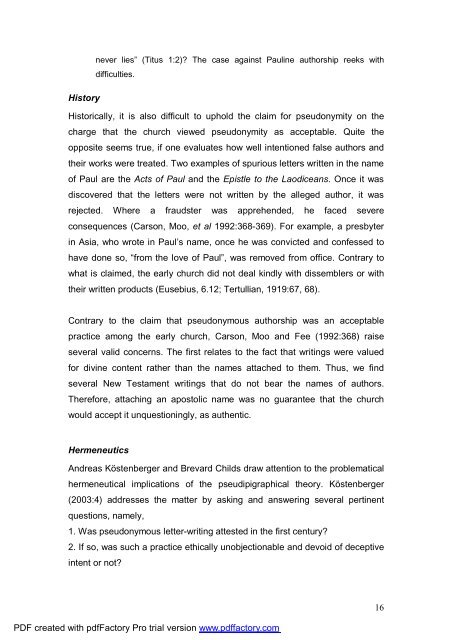A Text centred rhetorical analysis of Paul's Letter to Titus
A Text centred rhetorical analysis of Paul's Letter to Titus
A Text centred rhetorical analysis of Paul's Letter to Titus
You also want an ePaper? Increase the reach of your titles
YUMPU automatically turns print PDFs into web optimized ePapers that Google loves.
His<strong>to</strong>ry<br />
never lies” (<strong>Titus</strong> 1:2)? The case against Pauline authorship reeks with<br />
difficulties.<br />
His<strong>to</strong>rically, it is also difficult <strong>to</strong> uphold the claim for pseudonymity on the<br />
charge that the church viewed pseudonymity as acceptable. Quite the<br />
opposite seems true, if one evaluates how well intentioned false authors and<br />
their works were treated. Two examples <strong>of</strong> spurious letters written in the name<br />
<strong>of</strong> Paul are the Acts <strong>of</strong> Paul and the Epistle <strong>to</strong> the Laodiceans. Once it was<br />
discovered that the letters were not written by the alleged author, it was<br />
rejected. Where a fraudster was apprehended, he faced severe<br />
consequences (Carson, Moo, et al 1992:368-369). For example, a presbyter<br />
in Asia, who wrote in Paul’s name, once he was convicted and confessed <strong>to</strong><br />
have done so, “from the love <strong>of</strong> Paul”, was removed from <strong>of</strong>fice. Contrary <strong>to</strong><br />
what is claimed, the early church did not deal kindly with dissemblers or with<br />
their written products (Eusebius, 6.12; Tertullian, 1919:67, 68).<br />
Contrary <strong>to</strong> the claim that pseudonymous authorship was an acceptable<br />
practice among the early church, Carson, Moo and Fee (1992:368) raise<br />
several valid concerns. The first relates <strong>to</strong> the fact that writings were valued<br />
for divine content rather than the names attached <strong>to</strong> them. Thus, we find<br />
several New Testament writings that do not bear the names <strong>of</strong> authors.<br />
Therefore, attaching an apos<strong>to</strong>lic name was no guarantee that the church<br />
would accept it unquestioningly, as authentic.<br />
Hermeneutics<br />
Andreas Köstenberger and Brevard Childs draw attention <strong>to</strong> the problematical<br />
hermeneutical implications <strong>of</strong> the pseudipigraphical theory. Köstenberger<br />
(2003:4) addresses the matter by asking and answering several pertinent<br />
questions, namely,<br />
1. Was pseudonymous letter-writing attested in the first century?<br />
2. If so, was such a practice ethically unobjectionable and devoid <strong>of</strong> deceptive<br />
intent or not?<br />
PDF created with pdfFac<strong>to</strong>ry Pro trial version www.pdffac<strong>to</strong>ry.com<br />
16

















